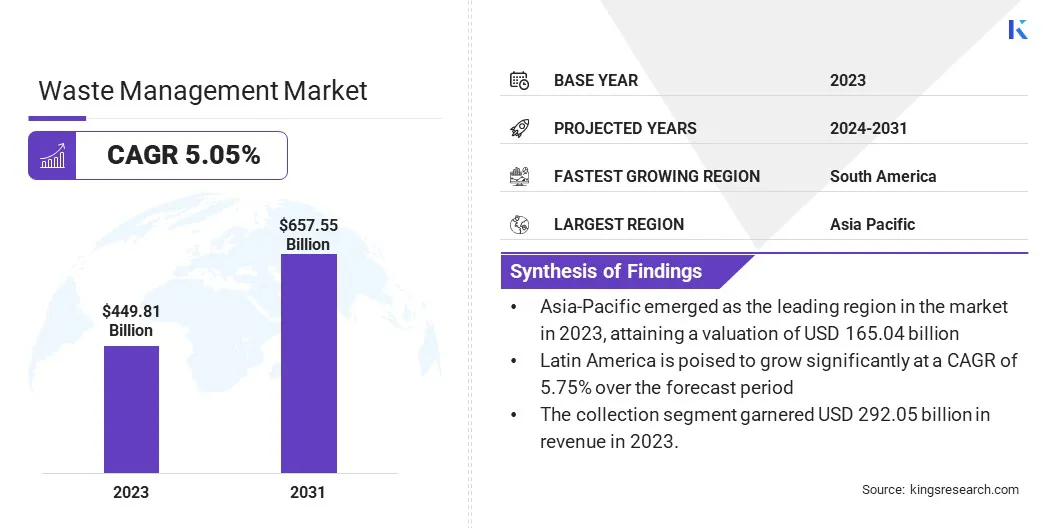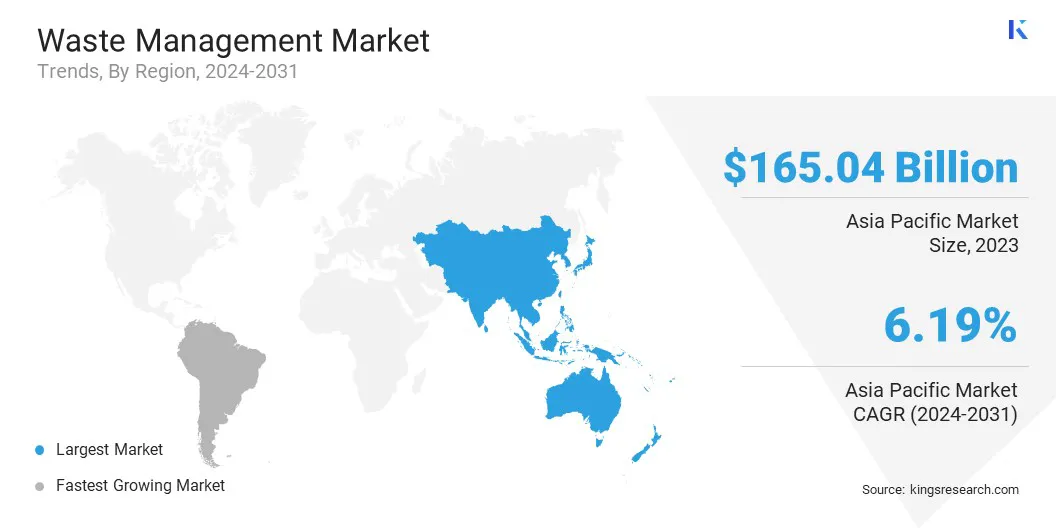Waste Management Market Size
Global Waste Management Market size was recorded at USD 449.81 billion in 2023, which is estimated to be at USD 465.78 billion in 2024 and projected to reach USD 657.55 billion by 2031, growing at a CAGR of 5.05% from 2024 to 2031. The market is experiencing robust growth due to rising awareness of environmental concerns and technological advancements in waste management.
In the scope of work, the report includes services offered by companies such as Waste Management, Inc., SUEZ, Veolia Environnement, Republic Services, Inc., Covanta Holding Corporation, Clean Harbors, Inc., Remondis Se & Co. Kg, Biffa Plc, Hitachi Zosen Corporation, Daiseki Co. Ltd, and others.
Rapid urbanization and population growth are significant factors driving the growth of the global waste management market. With the growing global population, the volume of waste generated is increasing significantly. Rapid urbanization often outpaces the development of waste management infrastructure, leading to challenges in waste collection, transportation, and disposal.
Moreover, urban areas tend to have higher consumption rates and produce diverse types of waste, including hazardous materials. To address these challenges, governments and municipalities are investing heavily in innovative waste management solutions such as advanced recycling facilities, waste-to-energy plants, and decentralized waste collection systems.
Additionally, public awareness campaigns and regulations are promoting responsible waste disposal practices and encouraging recycling and composting initiatives. As urbanization continues and populations grow, the demand for efficient and sustainable waste management solutions is expected to rise.
Waste management encompasses a range of activities aimed at reducing, collecting, transporting, recycling, and disposing of waste materials to minimize environmental impact. Its application areas include municipal waste management, industrial waste management, hazardous waste management, and electronic waste management, among others.
Technological advancements have revolutionized waste management, with innovations such as automated sorting systems, biological treatment methods, and waste-to-energy technologies improving efficiency and sustainability.
However, waste management is heavily influenced by regulations aimed at reducing landfilling, promoting recycling, and controlling pollution. These regulations impose strict standards on waste disposal practices, waste treatment methods, and emissions, resulting in the rising adoption of more sustainable waste management solutions.
Compliance with regulations is essential for waste management companies to operate legally and maintain public trust. Waste management practices are anticipated to witness widespread adoption and innovation to meet evolving regulatory requirements.

Analyst’s Review
Key players in the market are investing in advanced technologies to improve efficiency and sustainability throughout the waste management process. This includes implementing automated sorting systems, deploying waste-to-energy technologies, and adopting digital solutions for optimization and monitoring.
Companies are forging partnerships and collaborations with governments, municipalities, and other stakeholders to access funding, secure contracts, and navigate regulatory landscapes effectively.
Companies are focusing on diversifying their services to encompass a broader range of waste types and management solutions to mitigate risks associated with fluctuating consumer demand. Moreover, market players are emphasizing innovation and continuous improvement to stay ahead of the competition. The rising implementation of these strategies is expected to shape the market landscape in the upcoming years.
Waste Management Market Growth Factors
Increasing industrialization is a significant factor driving the growth in the global waste management market. As industries expand and production levels rise, there is an increase in both the volume and complexity of waste generated. Industrial waste includes various materials such as chemicals, metals, plastics, and organic matter, which pose challenges for proper disposal and treatment.
Moreover, industrial activities often produce hazardous waste that requires specialized handling and treatment to prevent environmental contamination and public health risks. To address these challenges, industries are implementing waste minimization strategies, improving resource efficiency, and adopting sustainable production practices.
Additionally, advancements in industrial symbiosis and closed-loop systems, are enabling industries to reuse and recycle waste materials, thereby reducing reliance on landfilling and virgin resources. With the expansion of industrialization globally, the demand for effective and sustainable industrial waste management solutions is expected to grow.
Rising levels of waste generation present a significant challenge to global waste management market progress. Population growth, rapid urbanization, and increasing consumption patterns contribute to higher volumes of waste being generated worldwide, placing strain on existing waste management infrastructure and available resources.
To overcome this challenge, key players are implementing a multi-faceted approach, including investment in waste management infrastructure and facilities, adoption of innovative waste management technologies, and implementation of waste reduction and recycling initiatives.
Governments and municipalities play a crucial role in addressing rising waste levels by implementing comprehensive waste management strategies, enforcing waste reduction and recycling regulations, and promoting public awareness and education campaigns on responsible waste disposal practices.
Furthermore, industry is witnessing collaboration between public and private sectors, along with community engagement, to develop sustainable waste management solutions tailored to the needs of diverse populations and address local waste management challenges effectively. These measures are leading to more sustainable waste management practices and reduced environmental impact.
Waste Management Market Trends
The global waste management market is experiencing a significant shift toward sustainable practices, driven by increasing environmental awareness and regulatory pressures. Companies and governments are increasingly prioritizing waste reduction, recycling, and resource recovery to minimize environmental impact and conserve natural resources.
Additionally, the rising integration of digitalization and data analytics is transforming waste management operations, enabling real-time monitoring, optimization, and decision-making. Digital technologies such as IoT sensors, RFID tagging, and predictive analytics are being increasingly deployed to improve waste collection efficiency, optimize route planning, and enhance resource allocation.
Furthermore, data analytics tools are used to analyze waste composition, identify recycling opportunities, and measure environmental performance, facilitating informed decision-making and continuous improvement. These trends are shaping market landscape by driving innovation, improving operational efficiency, and enabling more sustainable waste management practices.
In the upcoming years, these trends are forecasted to enable sustainable technologies and digital solutions to accelerate the transition toward a circular economy and more resource-efficient waste management systems.
Segmentation Analysis
The global waste management market is segmented based on service type, waste type, and geography.
By Service Type
Based on service type, the market is segmented into collection, transportation, and disposal. The collection segment led the market in 2023, reaching a valuation of USD 292.05 billion. The collection segment encompasses the gathering of waste materials from various sources such as households, businesses, and industries. Rapid urbanization and population growth has led to a notable increase in the demand for efficient and comprehensive waste collection services.
Additionally, rising environmental awareness and stringent regulations regarding proper waste disposal have propelled the need for organized and sustainable collection practices, thereby contributing to segmental dominance.
By Waste Type
Based on waste type, the market is classified into municipal waste, medical waste, industrial waste, and e-waste. The industrial waste segment secured the largest revenue share of 80.34% in 2023.
Industrial activities generate a significant volume of waste, comprising various materials such as chemicals, metals, and by-products of manufacturing processes. The production of industrial waste has surged due to the global trend of industrialization, leading to an increased demand for specialized waste management services tailored to handle industrial by-products safely and efficiently.
Additionally, industrial waste often includes hazardous materials that require specialized handling and treatment, thereby fostering the growth of this segment. Moreover, stringent regulations and environmental compliance standards impose requirements on industries to properly manage and dispose of their waste, thus contributing to the dominance of the industrial waste segment in the market.
Waste Management Market Regional Analysis
Based on region, the global waste management market is classified into North America, Europe, Asia-Pacific, MEA, and Latin America.

Asia-Pacific emerged as the leading region in the waste management market in 2023, attaining a valuation of USD 165.04 billion. Rapid urbanization, population growth, and industrial expansion in countries such as China, India, and Japan have led to a significant increase in waste generation in the region.
Moreover, growing environmental awareness and stringent regulations regarding waste management have spurred investments in infrastructure and technologies to address the escalating waste challenges effectively. Additionally, government initiatives and policies aimed at promoting sustainable waste management practices have propelled regional market growth.
Latin America is poised to grow significantly at a CAGR of 5.75% over the forecast period. The region is experiencing rapid urbanization and industrialization, leading to an increase in waste generation. Furthermore, rising awareness of environmental issues and the need for implementing sustainable waste management practices are prompting governments and businesses to invest in waste management infrastructure and technologies.
Additionally, favorable government policies and initiatives aimed at promoting recycling, waste reduction, and proper disposal are expected to stimulate regional market growth. As the region is prioritizing environmental sustainability and addressing waste management challenges, it presents lucrative opportunities for market expansion and investment in the coming years.
Competitive Landscape
The global waste management market report will provide valuable insight with an emphasis on the fragmented nature of the industry. Prominent players are focusing on several key business strategies such as partnerships, mergers and acquisitions, product innovations, and joint ventures to expand their product portfolio and increase their market shares across different regions.
Strategic initiatives, including investments in R&D activities, the establishment of new manufacturing facilities, and supply chain optimization, could create new opportunities for market growth.
List of Key Companies in Waste Management Market
- Waste Management, Inc.
- SUEZ
- Veolia Environnement
- Republic Services, Inc.
- Covanta Holding Corporation
- Clean Harbors, Inc.
- Remondis Se & Co. Kg
- Biffa Plc
- Hitachi Zosen Corporation
- Daiseki Co. Ltd
Key Industry Developments
- March 2024 (Expansion of Partnership): Cority, a leading provider of environmental, health, safety, and quality (EHSQ) software, expanded its partnership with Shell. This partnership was aimed at enhancing waste management practices. By integrating Cority's solutions, Shell intended to optimize waste management processes, improve regulatory compliance, and enhance sustainability initiatives across its global operations, demonstrating the company's commitment to environmental stewardship and operational excellence.
- July 2023 (Acquisition): Ardian, a global private investment firm, acquired a prominent European waste management and circular economy company, Attero. The acquisition aligned with Ardian's focus on promoting circular economy practices and enhancing waste management capabilities across Europe, positioning the company for further growth in the sector.
The Global Waste Management Market is Segmented as:
By Service Type
- Collection
- Transportation
- Disposal
By Waste Type
- Municipal Waste
- Medical Waste
- Industrial Waste
- E-Waste
By Region
- North America
- Europe
- France
- U.K.
- Spain
- Germany
- Italy
- Russia
- Rest of Europe
- Asia-Pacific
- China
- Japan
- India
- South Korea
- Rest of Asia-Pacific
- Middle East & Africa
- GCC
- North Africa
- South Africa
- Rest of Middle East & Africa
- Latin America
- Brazil
- Argentina
- Rest of Latin America


